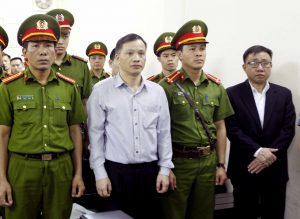Three years ago today Nguyen Bac Truyen disappeared from the busy streets of Ho Chi Minh City in Vietnam, while waiting for his wife near his place of work. Later the same day, the Ministry of Public Security (MPS) announced that he had been arrested alongside three other human rights defenders, accusing him of “acting to overthrow the people’s government.”
A member of the Hoa Hao Buddhist community, and a prominent advocate for religious freedom in Vietnam, Truyen’s case is just one example of the dismal human rights situation in the country. Religious minorities and individuals are some of the most heavily targeted.
Internationally, Vietnam has received widespread praise for its successful response to the coronavirus pandemic, having recorded just a few hundred cases and no deaths. However, the very apparatus used to combat the spread of the virus is used by the government to harass dissidents and others whose activities are deemed to threaten the state.
A major reason for Vietnam’s coronavirus success has been the neighborhood wardens who closely monitor communities, and have been able to sound the alarm and put in place heavy restrictions whenever a potential case is detected. This system comes under the remit of the MPS – the shadowy government department that detained Truyen.
Following his arrest, Truyen was held incommunicado for six months before his wife was allowed to see him. He was only granted access to his defense counsel two weeks before his trial, which lasted less than a day and saw him sentenced to 11 years’ imprisonment and three years of house arrest on charges of “carrying out activities aimed at overthrowing the people’s administration.”
It wasn’t the first time Truyen was targeted by Vietnam’s authorities. In 2006, he was sentenced to three and a half years in prison for “conducting propaganda” against the state, and released in May 2010.
His wife, Bui Thi Kim Phuong, has also been harassed. In March 2019, she was prevented from travelling from Vietnam to Germany and the United States, where she had planned to advocate on her husband’s behalf.
Truyen’s detainment is thought to be, at least in part, due to his work advocating for freedom of religion or belief in Vietnam, where the government continues to restrict fundamental freedoms.
According to the United States Commission on International Religious Freedom (USCIRF), a third of Vietnam’s more than 120 prisoners of conscience have been targeted because of their religious affiliation, or advocacy on behalf of freedom of religion or belief. USCIRF has recommended the U.S. Department of State to designate Vietnam as a “country of particular concern” due to its engagement in or tolerance of systematic, ongoing, and egregious violations of freedom of religion or belief.
Those facing abuses include Hoa Hao Buddhists, such as Truyen, Khmer Krom Buddhists, Hmong and Montagnards Christians, the Unified Buddhist Church of Vietnam, and Falun Gong, Cao Dai, An Dan Dai Dao, and Duong van Minh adherents, among others. USCIRF documented cases of prisoners of conscience being denied access to religious texts, visits, and adequate food and medical supplies.
As well as arbitrary arrests and imprisonment, harassment of religious groups in Vietnam comes in the form of interrupted religious ceremonies, the prevention of religious gatherings, forcing individuals to renounce their faith, and in some cases violent physical assault. There have also been reports of authorities destroying religious properties and confiscating land of religious significance under the guise of economic development.
The situation for religious freedom in Vietnam saw another setback in January 2018, when the government enacted the Law on Belief and Religion, which gives the government overly broad powers to restrict the right to freedom of religion or belief. The law also requires religious organizations to register with the state and to regularly report their activities, raising concerns it could be used by the government to further suppress religious groups.
As Truyen, and dozens like him, languish in prison, also concerning is the poor condition of Vietnam’s jails, where there have long been accusations of ill-treatment, forced labor, and deaths in custody.
In Southeast Asia, the dire treatment of prisoners is sadly not unique to Vietnam. Nor is the practice of jailing people for political reasons, or for holding beliefs that the state deems to be against national interests.
Prison systems across the region operate well above capacity, with Indonesia holding almost double the amount of prisoners its network of jails can handle, while the Philippines has almost five times the amount. There are no accurate figures for Vietnam.
There have long been calls for governments in Southeast Asia to decrease their prisoner populations, but the issue has become more pronounced in recent months, with the spread of coronavirus. Public health officials have advised people to remain at least one meter apart from others to stop the virus from spreading, but how do you manage that if you’re crammed into a packed prison cell?
With Southeast Asia’s prisons full to bursting, and a high risk of contagion, what are peaceful human rights advocates still doing behind bars? All prisoners of conscience, including those advocating for religious freedom, across the region must be released immediately and unconditionally.
In the midst of a global pandemic, and on the third anniversary of his arrest, Vietnamese authorities must immediately and unconditionally release Truyen, and everyone who is imprisoned solely for peacefully exercising their human rights. They also need to allow independent religious groups in Vietnam to freely conduct their religious and belief activities without fear of persecution, harassment, and imprisonment.
Kasit Piromya is a former Thai member of parliament and foreign minister, and a board member of ASEAN Parliamentarians for Human Rights.

































